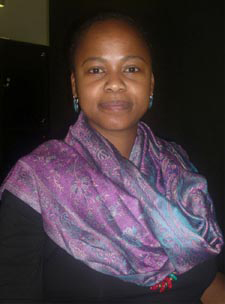

Oct. 30: ArtRage
October 23, 2017
South African art historian to discuss art, reconciliation
South African art historian and artist Nomusa Makhuba will speak about how art signifies inclusion at 5 p.m., Monday, Oct. 30, in Room 202 of Old College Hall on the University of Delaware’s Newark campus.
Makhuba teaches art history and visual culture at the University of Cape Town (UCT) in South Africa. Currently, her research focuses on African popular culture, photography, interventionism, live art and socially engaged art.

The lecture, “ArtRage and the Politics of Reconciliation: Decolonizing Curatorial Practice in South Africa,” is co-sponsored by UD’s African Studies Program, the Center for Global and Area Studies and the College of Arts and Sciences’ Paul R. Jones Initiative.
Makhuba’s lecture will explore the complexities of curating art, not in controlled institutional exhibition spaces, but in volatile and conflicted “post-apartheid” public spaces such as campuses and cities. She will examine how offensive artworks are experienced by affected groups in South Africa, echoing the response to Confederate memorial statuary in the United States.
Her work in the area is inspired by the 2016 Shackville Protests, during which several pieces of UCT’s expansive art collection were burned on campus. In response, the university created an Artworks Task Team.
The task of the team, Makhuba said, was “to engage with what students felt were offensive overwhelming visual signifiers of the violent histories of colonialism and apartheid at the institution.” It was found that curation was the key to changing the way offensive artworks were experienced, especially by black students and academics.
The lecture is free and open to current students, faculty and staff. For more information visit the Center for Global and Area Studies website.
Contact Us
Have a UDaily story idea?
Contact us at ocm@udel.edu
Members of the press
Contact us at 302-831-NEWS or visit the Media Relations website

